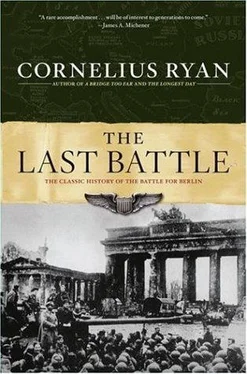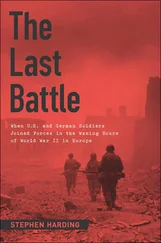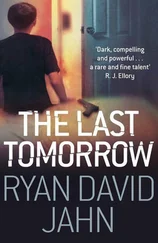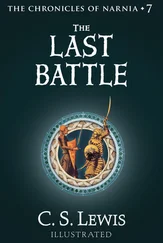Cornelius Ryan - The Last Battle
Здесь есть возможность читать онлайн «Cornelius Ryan - The Last Battle» весь текст электронной книги совершенно бесплатно (целиком полную версию без сокращений). В некоторых случаях можно слушать аудио, скачать через торрент в формате fb2 и присутствует краткое содержание. Город: New York, Год выпуска: 1995, ISBN: 1995, Издательство: Simon & Schuster Paperbacks, Жанр: military_history, История, на английском языке. Описание произведения, (предисловие) а так же отзывы посетителей доступны на портале библиотеки ЛибКат.
- Название:The Last Battle
- Автор:
- Издательство:Simon & Schuster Paperbacks
- Жанр:
- Год:1995
- Город:New York
- ISBN:978-0-684-80329-6
- Рейтинг книги:3 / 5. Голосов: 1
-
Избранное:Добавить в избранное
- Отзывы:
-
Ваша оценка:
- 60
- 1
- 2
- 3
- 4
- 5
The Last Battle: краткое содержание, описание и аннотация
Предлагаем к чтению аннотацию, описание, краткое содержание или предисловие (зависит от того, что написал сам автор книги «The Last Battle»). Если вы не нашли необходимую информацию о книге — напишите в комментариях, мы постараемся отыскать её.
The Last Battle The Last Battle
The Last Battle — читать онлайн бесплатно полную книгу (весь текст) целиком
Ниже представлен текст книги, разбитый по страницам. Система сохранения места последней прочитанной страницы, позволяет с удобством читать онлайн бесплатно книгу «The Last Battle», без необходимости каждый раз заново искать на чём Вы остановились. Поставьте закладку, и сможете в любой момент перейти на страницу, на которой закончили чтение.
Интервал:
Закладка:
This morning Wiberg decided to drop in at his favorite bar, Harry Rosse’s at 7 Nestorstrasse—one of the few left open in the district. It had a varied clientele: Nazi bigwigs, German officers, and a smattering of businessmen. There was always good conversation and one could catch up on the latest news—where last night’s bombs had fallen, which factories had been hit, how Berlin was standing up under it all. Wiberg liked meeting his old friends in this convivial atmosphere and he was interested in just about every aspect of the war, especially the effects of the bombings and the morale of the German people. In particular he wanted to know where Hitler was. As he crossed the street he once again tipped his hat to an old acquaintance. Despite all the questions that crowded his mind, Wiberg knew a few things that would have surprised his neighbors. For this Swede who was more German than the Germans was also a member of America’s top-secret Office of Strategic Services. He was an Allied spy.
In his ground-floor apartment in Kreuzberg, Dr. Arthur Leckscheidt, Evangelical pastor of the Melanchthon Church, was beset by grief and despair. His twin-spired Gothic church was destroyed and his flock dissipated. Through the windows he could see the remains of his church. A few weeks before it had received a direct hit and, minutes later, incendiaries had set it ablaze. The sorrow he felt each time he looked at it had not yet abated. At the height of the raid, oblivious of his own safety, Pastor Leckscheidt had rushed into the blazing church. The back of the edifice and its magnificent organ were still intact. Running swiftly up the narrow steps to the organ loft, Leckscheidt had but one thought: to bid farewell to his beloved organ and to the church. Singing softly to himself, eyes filled with tears, Dr. Leckscheidt played his farewell. As bombs burst all over Kreuzberg, incredulous patients in the nearby Urban Hospital and people sheltering in adjacent cellars heard the Melanchthon organ pealing out the ancient hymn, “From Deepest Need I Cry to Thee.”
Now he was saying a different kind of good-bye. On his desk was the draft of a round-robin letter he would send to those many parishioners who had left the city or were in the armed forces. “Even though fighting in the east and west is keeping us in tension,” he wrote, “the German capital is constantly the center of air raids… you can imagine, dear friends, that death is reaping a rich harvest. Coffins have become a scarcity. A woman told me that she had offered twenty pounds of honey for one in which to lay her deceased husband.”
Dr. Leckscheidt was also angered. “We ministers are not always called to burials of air raid victims,” he wrote. “Often the Party takes over the funerals without a minister… without God’s word.” And again and again throughout his letter, he referred to the devastation of the city. “You cannot imagine what Berlin looks like now. The loveliest buildings have crumbled into ruins…. Often we have no gas, light or water. God keep us from a famine! Terrific prices are asked for black-market commodities.” And he ended on a note of bitter pessimism: “This is probably the last letter for a long time. Perhaps we shall soon be cut off from all communication. Shall we see each other again? It all rests in God’s hands.”
Cycling purposefully through the littered streets of Dahlem, another clergyman, Father Bernhard Happich, had decided to take matters into his own hands. A delicate problem had worried him for weeks. Night after night he had prayed for guidance and meditated on the course he should take. Now he had reached a decision.
The services of all clergymen were in great demand, but this was particularly true of Father Happich. The 55-year-old priest, who carried the words “Jesuit: not fit for military service” stamped across his identity card (a Nazi imprint like that reserved for Jews and other dangerous undesirables), was also a highly skilled doctor of medicine. Among his many other duties he was the Father Provincial of Haus Dahlem, the orphanage, maternity hospital and foundling home run by the Mission Sisters of the Sacred Heart. It was Mother Superior Cunegundes and her flock who had brought about his problem, and his decision.
Father Happich had no illusions about the Nazis or how the war must surely end. He had long ago decided that Hitler and his brutal new order were destined for disaster. Now the crisis was fast approaching. Berlin was trapped—the tarnished chalice in the conqueror’s eye. What would happen to Haus Dahlem and its good, but less than worldly, Sisters?
His face serious, Father Happich pulled up outside the home. The building had suffered only superficial damage and the Sisters were convinced that their prayers were being heard. Father Happich did not disagree with them, but being a practical man he thought that luck and bad marksmanship might have had something to do with it.
As he passed through the entrance hall he looked up at the great statue, garbed in blue and gold, sword held high—Saint Michael, “God’s fighting knight against all evil.” The Sisters’ faith in Saint Michael was well founded, but just the same Father Happich was glad he had made his decision. Like everyone else he had heard from refugees who had fled before the advancing Russians of the horrors that had taken place in eastern Germany. Many of the accounts were exaggerated, he was sure, but some he knew to be true. Father Happich had decided to warn the Sisters. Now he had to choose the right moment to tell them, and above all he had to find the right words. Father Happich worried about that. How do you tell sixty nuns and lay sisters that they are in danger of being raped?
 3
3 
THE FEAR OF SEXUAL ATTACK lay over the city like a pall, for Berlin, after nearly six years of war, was now primarily a city of women.
At the beginning, in 1939, there were 4,321,000 inhabitants of the capital. But huge war casualties, the call-up of both men and women and the voluntary evacuation of one million citizens to the safer countryside in 1943-44 had cut that figure by more than one third. By now the only males left in any appreciable number were children under eighteen and men over sixty. The 18-to-30 male age group totaled barely 100,000 and most of them were exempt from military service or wounded. In January, 1945, the city’s population had been estimated at 2,900,000 but now, in mid-March, that figure was certainly too high. After eighty-five raids in less than eleven weeks and with the threat of siege hanging over the city, thousands more had fled. Military authorities estimated that Berlin’s civil population was now about 2,700,000, of whom more than 2,000,000 were women—and even that was only an informed guess.
Complicating efforts to obtain a true population figure was the vast exodus of refugees from the Soviet-occupied eastern provinces. Some put the refugee figure as high as 500,000. Uprooted, carrying their belongings on their backs or in horse-drawn wagons or pushcarts, often driving farm animals before them, fleeing civilians had clogged the roads into Berlin for months. Most did not remain in the city, but continued west. But in their wake they left a repository of nightmarish stories; these accounts of their experiences had spread like an epidemic through Berlin, infecting many citizens with terror.
The refugees told of a vengeful, violent and rapacious conqueror. People who had trekked from as far away as Poland, or from the captured parts of East Prussia, Pomerania and Silesia, gave bitter testimony of an enemy who offered no quarter. In fact, the refugees declared, Russian propaganda was urging the Red Army to spare no one. They told of a manifesto, said to have been written by the Soviet Union’s top propagandist, Ilya Ehrenburg, which was both broadcast and distributed in leaflet form to the Red troops. “Kill! Kill!” went the manifesto. “In the German race there is nothing but evil!… Follow the precepts of Comrade Stalin. Stamp out the fascist beast once and for all in its lair! Use force and break the racial pride of these Germanic women. Take them as your lawful booty. Kill! As you storm onward, kill! You gallant soldiers of the Red Army.” [1] I have not seen the Ehrenburg leaflet. But many of those I interviewed did. Furthermore, it is mentioned repeatedly in official German papers, war diaries and in numerous histories, the most complete version appearing in Admiral Doenitz’ Memoirs , page 179. That the leaflet existed I have no doubt. But I question the above version, for German translations from Russian were notoriously inaccurate.Still Ehrenburg wrote other pamphlets which were as bad, as anyone can see from his writings, particularly those officially published in English during the war by the Soviets themselves, in Soviet War News , 1941-45, Vols. 1-8. His “Kill the Germans” theme was repeated over and over—and apparently with the full approval of Stalin. On April 14, 1945, in an unprecedented editorial in the Soviet military newspaper Red Star , he was officially reprimanded by the propaganda chief, Alexandrov, who wrote: “Comrade Ehrenburg is exaggerating… we are not fighting against the German people, only against the Hitlers of the world.” The reproof would have been disastrous for any other Soviet writer, but not for Ehrenburg. He continued his “Kill the Germans” propaganda as though nothing had happened—and Stalin closed his eyes to it. In the fifth volume of his memoirs, People, Years and Life , published in Moscow, 1963, Ehrenburg has conveniently forgotten what he wrote during the war. On page 126 he writes: “In scores of essays I emphasized that we must not, indeed we cannot, hunt down the people—that we are, after all, Soviet people and not Fascists.” But this much has to be said: no matter what Ehrenburg wrote, it was no worse than what was being issued by the Nazi propaganda chief, Goebbels—a fact that many Germans have conveniently forgotten, too.
Интервал:
Закладка:
Похожие книги на «The Last Battle»
Представляем Вашему вниманию похожие книги на «The Last Battle» списком для выбора. Мы отобрали схожую по названию и смыслу литературу в надежде предоставить читателям больше вариантов отыскать новые, интересные, ещё непрочитанные произведения.
Обсуждение, отзывы о книге «The Last Battle» и просто собственные мнения читателей. Оставьте ваши комментарии, напишите, что Вы думаете о произведении, его смысле или главных героях. Укажите что конкретно понравилось, а что нет, и почему Вы так считаете.












